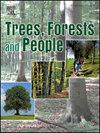确定向可持续森林管理过渡的主要参与者、障碍和机遇:在西班牙巴斯克地区的应用
IF 2.7
Q1 FORESTRY
引用次数: 0
摘要
林业部门对于实现向可持续性过渡至关重要,因为其管理和实践的转变带来了机遇。然而,人工林管理的特点不仅在于生态互动,还在于多方参与者的互动、他们的知识和世界观所产生的复杂动态,以及参与者如何克服障碍并游说政策和管理部门体现他们的价值观和利益。我们通过西班牙巴斯克地区的案例研究来说明这一点。我们在 2022 年和 2023 年对 33 名林业参与者进行了深入的半结构式定性访谈,目的是:a) 确定谁是能够引发可持续森林管理变革的潜在参与者;b) 探索参与者之间的互动和知识交流,以促进向可持续森林管理的转变;c) 了解主要参与者在实现可持续人工林管理方面面临的机遇和障碍。我们的研究结果表明:a) 有能力促使巴斯克地区林业部门进行变革的是土地所有者、护林员和私营企业;b) 相互学习发生在人工林管理的日常实践中,而学术知识并没有深入到政策和实践中;c) 障碍与管理、政治和个人因素有关,这些因素阻碍了 "亲近自然 "管理和 "循环生物经济 "的发展,例如人们认为缺乏支持政策和知识,以及土地荒芜现象日益严重。除其他外,提供优质木材的本地物种人工林,以及开辟更多的市场,例如为人工林可能为人类带来的各种贡献提供资金,这些都是潜在的前进道路。为克服小规模植树造林管理方面的障碍而开展的合作,以及为促进人们对天然林和植树造林的感情而采取的行动,对于实现巴斯克地区的可持续森林管理至关重要。本文章由计算机程序翻译,如有差异,请以英文原文为准。
Identifying key actors, barriers and opportunities to lead a transition towards sustainable forest management: an application to the Basque Country, Spain
The forestry sector is essential for achieving a transition towards sustainability because of the opportunities associated with the transformation of their management and practices. However, forest plantation management is characterised not only by ecological interactions but also by the complex dynamics that arise from the interaction of multiple actors, their knowledge and worldviews, and how actors can overcome barriers and lobby for their values and interests to be represented in policies and management. We illustrate this via a case study: the Basque Country in Spain. Drawing on 33 qualitative in-depth semistructured interviews conducted in 2022 and 2023 with a wide variety of forestry actors, we aim to a) identify who the potential actors are that can trigger a change toward sustainable forest management, b) explore actors’ interactions and knowledge interchange that can foster a transformation toward sustainable forest management, and c) understand the opportunities and barriers that the main actors face to achieve sustainable forest plantation management. Our results show that a) those who may have the ability to induce a change in the forestry sector of the Basque Country are landowners, rangers and private sector companies; b) mutual learning happens in the day-to-day practices of forest plantation management while academic knowledge does not reach policy and practice; and c) barriers are related to managerial, political and individual dimensions that impair the way towards “close to nature” management and a “circular bioeconomy”, such as a perceived lack of supporting policies and knowledge, as well as increasing land abandonment. Opportunities to pose a potential way forward are, among others, forest plantations of native species providing high-quality timber, and opening access to additional markets, such as the ones funding the diversity of contributions that forest plantations may bring to people. Collaboration to overcome barriers for small-scale forest plantation management and actions to promote a stronger feeling of attachment to natural forests and forest plantations are essential to achieve sustainable forest management in the Basque Country.
求助全文
通过发布文献求助,成功后即可免费获取论文全文。
去求助
来源期刊

Trees, Forests and People
Economics, Econometrics and Finance-Economics, Econometrics and Finance (miscellaneous)
CiteScore
4.30
自引率
7.40%
发文量
172
审稿时长
56 days
 求助内容:
求助内容: 应助结果提醒方式:
应助结果提醒方式:


